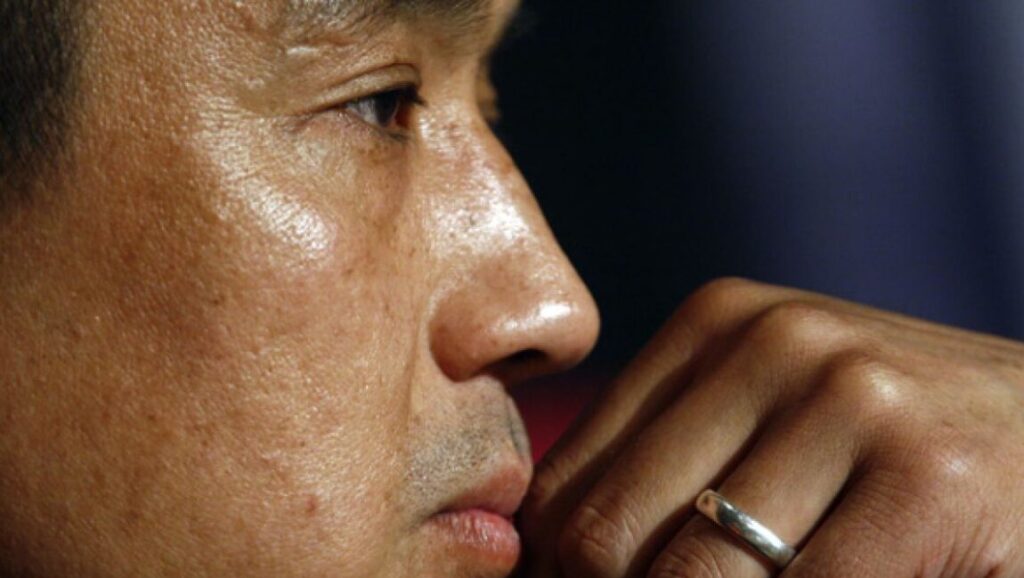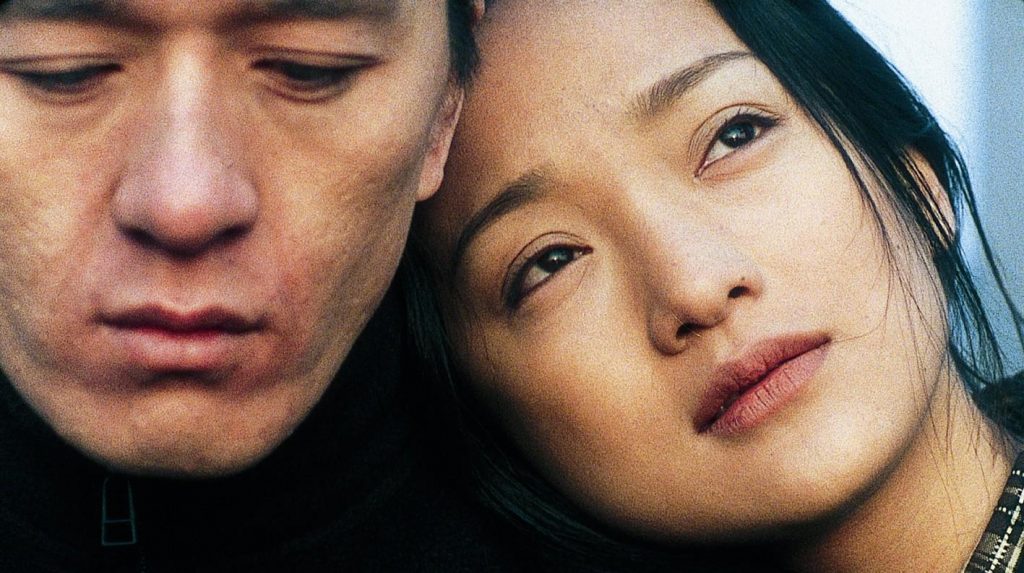After a first encounter, Chinese filmmaker Lou Ye seemed ripe for being written off as a Wong Kar-wai copycat — at best an adept craftsman of soft-focus, woozily shot images of beautiful men and women, bathed in shadow, moving kinetically through rain-streaked city streets. The film that suggested this was 2003’s Purple Butterfly, a quixotic, genre-inflected drama that immediately stood-out from the work of Lou’s Sixth Generation contemporaries by virtue of being a period piece. Set in Japanese-occupied Shanghai, in the early 1930s, the sprawling saga pivots around acts of espionage, revenge, and duplicity, and traces the labyrinthian relationship between a band of Chinese resistance fighters, a cabal of Japanese officers, and one heartbroken casualty of the violence that erupts between them.
As in Wong’s slippery ensemble pieces, matters of the heart are crucial in Purple Butterfly — but rather than being a work of beguiling romanticism, Lou’s film is possessed by a sobering fatalism. When one recognizes this — that the long-takes of sumptuously lit faces in tight close-up against blurred and grainy backgrounds are not meant to impart feelings of gauzy nostalgia, but rather they channel the psyche of characters in the throes of existential crises — one may also start to grasp that Lou is up to a lot more than style for style’s sake. One may even start to see Lou, circa the mid-2000s, as having less of a kinship with the other Chinese filmmakers of that era than he does with directors of various nationalities who recognized, early on, how digital photography could change the weather of a film.
Lou’s biggest debt to the Sixth Generation movement — to which his 1995 film Weekend Lover is considered a cornerstone — is the DIY sensibility favored by many young Chinese directors in the ‘90s, who had to work quickly and discreetly to avoid a vigilant culture of censorship. Digital cameras were a medium of necessity for many of these filmmakers, the best way to occupy, and shoot in, spaces — undetected. But for Lou, at least around the end of the last millennium, the possibilities of digital were more intuitively explored: he saw how naturalistic techniques of cinéma vérité could be augmented by the immediacy of DV cameras, how a documentarian’s approach to blocking and montage could be seamlessly employed and signified through the inherent non-filmic qualities of digital photography. And in Purple Butterfly, years before Michael Mann’s Public Enemies, Lou recognized that an un-camouflaged digital image also had the capacity, in the context of an anachronistic setting, to form a dialectical relationship between a film’s temporal past and its aesthetic present.
But let’s backtrack a bit, because Lou’s discovery of, and experimentation with, digital cinema actually reached its zenith a few years before Purple Butterfly — in the year 2000, with his breakthrough festival hit Suzhou River. In the film, immediate attention is called to the utilization of new technology: the opening sequence is shot with a handheld DV camera and framed as if it is the subjective experience of a character, “The Videographer.” The imprecision of the image, the way it distorts and blurs and is made askew, becomes something of a modern spin on the concept of Dziga Vertov’s ‘Kino-Eye’: only a digital camera, not the human eye, could ‘see’ in this way.
Years before Michael Mann’s Public Enemies, Lou recognized that an un-camouflaged digital image also had the capacity, in the context of an anachronistic setting, to form a dialectical relationship between a film’s temporal past and its aesthetic present.
More than just an uncanny object d’art, though, Suzhou River is also the rare reimagining of Alfred Hitchcock’s Vertigo that actually has something new to say. Lou’s film taps the same vein of obsession as Hitch’s watershed: one man’s infatuation with a woman results in an almost transcendental act of duplication. (A then-largely-unknown Zhou Xun, in a remarkably modulated and wrenching performance, plays both a woman from the past and her contemporaneous counterpart). Suzhou River’s uniqueness, then, comes from its relationship to replication as predicated on the digital image. Identities fracture and atomize, roles blur, and plot becomes an unreconciled cyclicality.
Consider the respective ‘imaginaries’ that inform Hitchcock’s, and Lou’s, two subtlety divergent forms of self-identification. Vertigo is a dialectical film about obsession and the image from an age when cinema was bounded by its physical form — therefore, it resolves in a duality. Lou’s Suzhou River, though, reflects the digital epoch, where cinema’s computational form loses indexicality and begins to approach an actual infinite. To put it another way, think of Suzhou River as a feature-length articulation of what it feels like to point a DV camera at its live feed on a monitor — an ‘infinity’ loop.
With all this aesthetic sophistication, and with a ballast of political subversiveness (he was banned from making films by the Chinese authorities in the mid-2000s), why is it, then, that Lou Ye is just not a very celebrated filmmaker, at least in the West? I can hazard a guess: he is neither the kind of auteur that fans of Asian genre movies tend to gravitate toward, nor the emotionally accessible filmmaker that fans of indie Asian cinema embrace. Instead, he’s something of an idiosyncrasy, a director capable of blending genre and arthouse sensibilities into a hybridized formalism, and one who, if he was European (like Olivier Assayas, or Jacques Audiard) would be much more likely to find an audience.
Lou himself has proven how important it is for his films to strike the right balance between human drama and visceral craft, through his own work: Over the last two decades, Lou’s least vital films have tended to be those that step too far in one direction (2012’s flaccid procedural Mystery) or the other (2011’s divisive romantic drama Love and Bruises). This could be another reason why he hasn’t managed to get a foothold with western critics — because he isn’t a particularly consistent director. But even lesser Lou films (and there are many in this retrospective that our writers are unkind to) conjure-up interesting ideas even when they don’t execute them all that well.
Suzhou River reflects the digital epoch, where cinema’s computational form loses indexicality and begins to approach an actual infinite…a feature-length articulation of what it feels like to point a DV camera at its live feed on a monitor — an ‘infinity’ loop.
Maybe the most complimentary thing that I can think of to say about Lou’s films — and that I hope certain people might take to heart, maybe — is that the opinions I have formed of them never feel settled on a first, or even a second, viewing. Take 2014’s Blind Massage, which is regarded by many Chinese critics as one of Lou’s best, and which, not unlike another Sixth Generation film (Zhang Yuan’s Mama from 1990) precariously positions itself between message picture, aestheticized film object, and an earnest narrative exhibiting deep empathy and understanding for those who suffer mental and physical disabilities (an especially important topic for the Chinese discourse).
Problems arise only as Blind Massage starts to push too forcefully in all of these different directions at once: certain aestheticized sequences, which attempt to approximate the sensorial experience of blindness, scan, at first, as bold and purposeful — but after repeated use, they lapse into the realm of sensationalism. And while intimate, interpersonal moments which Lou excels at capturing are imbued with a documentary-like realism, thanks to both the fluid cinematography and Lou’s very ‘free’ approach to working with actors, Blind Massage is nonetheless hampered by a lugubrious screenplay.
It’s worth noting that Blind Massage, like Mystery, is an adaptation — and as such, its not unreasonable to suspect that some of its more maudlin moments (a character reciting impromptu poetry, or a man delivering an intense, postcoital declaration) may originate from the source material. But it’s also hard to get away from the feeling that this has been a recurring issue for Lou — that his strong filmmaking instincts are frequently undercut by weaknesses in the dramatic material that he chooses to work with. The most obvious example of this is Mystery, which has a terrible screenplay, but which Lou directs like he’s making his own Memories of Murder anyway.
This is why Lou’s latest, The Shadow Play — which has been gestating in Chinese censorship hell for the last couple of years — is such a cause for celebration. Here, despite apparently having to cut down his desired version of the film for the authorities to give it a commercial release, Lou gets just about everything right: The scale and scope of Purple Butterfly are enfolded into a narrative with the procedural immediacy of Mystery, and the formal chops of Suzhou River. All that’s really missing is an emotional connection as trenchant as that of Blind Massage — but then, this likely has a lot to do with the film’s centerpiece romantic relationship being drastically truncated by the censors.
Blind Massage, which is regarded by many Chinese critics as one of Lou’s best, and which, not unlike another Sixth Generation film (Zhang Yuan’s Mama from 1990) precariously positions itself between message picture, aestheticized film object, and an earnest narrative exhibiting deep empathy and understanding for those who suffer mental and physical disabilities.
The Shadow Play is a work of ruthless nihilism, a kind of terminus for a filmmaker who’s spent much of his career fortifying his belief that any lasting human connection is a near impossibility in a world where everyone’s face is a mask, a society of unending deception. This outlook of absolute disillusionment has not only scathingly political dimensions (a rejection of the false promise of Chinese prosperity, cleverly disguised by the sensationalism of a genre framework), but is also rendered through Lou’s most uncompromising display of imagistic chaos.
A Michael Mann comparison has never felt more appropriate in relation to Lou than it does here: the malaise of modernity, and the anxiety of a new millennium, manifest in harsh color contrasts and ceaseless motion, as characters struggle to sift through, and make sense of, a deluge of indiscriminate data. The Shadow Play is Lou Ye’s Blackhat. And that high compliment makes it all the more disheartening that it looks to join the long list of Lou’s films that have been largely ignored in the West (it’s already had its theatrical run in China, and U.S. distributors aren’t biting).
Still, there are signs of change: The excellent New York-based Chinese film festival CineCina, for its inaugural edition, just programmed a nearly complete retrospective of Lou Ye’s films, while Lou’s next project, Saturday Fiction (which, rumor has it, didn’t make the cut at Cannes due to more monkey business from the Chinese authorities) stars Gong Li, has generated substantial buzz, and boasts a splashy historical narrative: “An actress working undercover for the Allies in 1941 Shanghai discovers the Japanese plan to attack Pearl Harbor.” It could be the perfect project to bring this director international attention; and then, we may all recognize we’ve been underestimating Lou Ye.
Over the next week, our writers will review each of the feature films that Lou Ye has made to date. That makes for a total of 10 reviews, which have been divided up into two sections representing very loosely defined phase in the filmmaker’s career: Pt. 1: Love Her for a Day (1996-2008) and Pt. 2: Achieve Dreams of Wealth (2010-2019). Look for Pt. 1 on May 14 & Pt. 2 on May 15.
Pt. 1: Love Her for a Day (1994 – 2008): Don’t Be Young (1994), Weekend Lover (1995), Suzhou River (2000), Purple Butterfly (2004), and Summer Palace (2008).
Pt. 2: Achieve Dreams of Wealth (2010 – 2019): Spring Fever (2010), Love and Bruises (2011), Mystery (2012), Blind Massage (2014), The Shadow Play (2019*).
* Pending release in the U.S.
















Comments are closed.